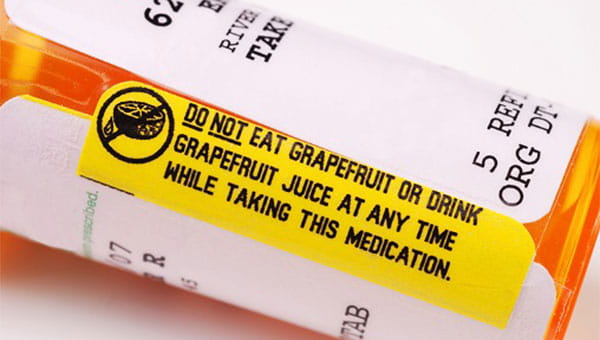Take With Food
Eating or drinking certain foods and beverages might impact the effectiveness of some medications, and you should be aware of these interactions.
When your medicine and food interfere with each other (both over-the-counter and prescription medications and iron pills, vitamins and antacids), it is a food and drug interaction, according to the American Academy of Family Physicians. It adds that food does not affect all medications, but some medicines are impacted by what or when you eat.
The organization encourages you to talk to your doctor or pharmacist before you start taking new medication and to closely read the prescription label on the bottle. It notes you should consult your health care provider if you have questions about your diet and any interactions with the medications you take, if you need more information about any side effects of your medicines, and if your health isn’t improving after you begin taking new medicine.
Consumer Reports has compiled a list of some foods that could interact with your medicines:
- Cheese, milk, yogurt, antacids with calcium and calcium supplements: Avoid eating these items that have calcium if you’re taking tetracycline, an antibiotic. If you mix them, it could disrupt the ability of your body to fully absorb tetracycline. The antibiotic generally is more effective if you take it one hour before or two hours after you eat.
- Grapefruit juice: Avoid drinking grapefruit juice if you take cholesterol-lowering statin medications like simvastatin (Zocor and generic) or atorvastatin (Lipitor and generic). The juice can boost the strength of the medications and their side effects such as muscle pain.
- Spinach, kale, cabbage, Brussels sprouts and broccoli: Avoid eating these greens, which are full of vitamin K, while taking blood thinners like warfarin (Coumadin). Foods with large amounts of vitamin K can decrease the ability of these drugs to thin your blood. This could cause a stroke or heart attack in some people who have heart disease.
- Bananas, oranges, salt substitutes and green leafy vegetables: Avoid eating these high-potassium foods while taking ACE inhibitors – lisinopril (Prinivil, Zestril); captopril (Capoten); and enalapril (Vasotec) – that treat heart failure or decrease blood pressure. Also, avoid eating these foods with some diuretics – for example, triamterene (Dyrenium) – that treat high blood pressure and reduce your fluid retention. If you take any of these medications and eat these foods, your body’s potassium level could increase, and you could be in danger of developing heart palpitations or an irregular heartbeat.
- Alcohol (tap beer, sherry and red wine), avocados, salami, chocolate and bananas: Avoid drinking these beverages and eating these foods that have tyramine if you take drugs like linezolid (Zyvox) and metronidazole (Flagyl), which treat bacterial infections. Tyramine is an amino acid that’s also in aged, fermented, smoked or pickled foods like dry sausage and processed cheeses, and it could cause spikes in your blood pressure if mixed with linezolid. You could experience stomach cramping, nausea and vomiting if you mix metronidazole and alcohol.
- Walnuts and soybean flour: Avoid eating these high-fiber foods if you’re taking thyroid drugs like levothyroxine (Synthroid, Levothroid and Levoxyl). They can interfere with your body’s ability to absorb these medications. Talk to your doctor about trying to take these medications in the evenings if you eat a diet that’s high in fiber.
- Real black licorice (or supplements with licorice extract): Avoid eating real black licorice or supplements containing licorice extract if you’re taking digoxin (Lanoxin), which treats abnormal heart rhythms and heart failure; blood thinners; and most blood pressure drugs. Real black licorice and supplements with licorice extract have glycyrrhizin, and if it’s combined with digoxin, it could cause an irregular heartbeat or possibly death. Glycyrrhizin also might make most blood pressure medications less effective and amplify the side effects of blood thinners.
When starting on a new medication, speak with your physician about foods to avoid.

